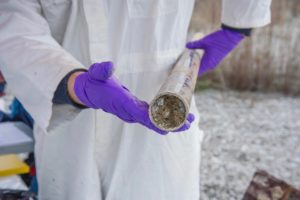
In a Nature Communications report, a team of Berkeley Lab Biosciences Area scientists detail the first-ever successful use of a technique called BONCAT to isolate active microbes present in a sample of soil. Working within a Berkeley Lab-led scientific focus area called ENIGMA (for Ecosystems and Networks Integrated with Genes and Molecular Assemblies), Trent Northen’s lab in the Environmental Genomics and Systems Biology (EGSB) division teamed with JGI researchers on the work.
“Soils are probably the most diverse microbial communities on the planet,” said Estelle Couradeau, first author of the study. “In every gram of soil, there are billions of cells from tens of thousands of species that, all together, perform important Earth nutrient cycles. They are the backbone of terrestrial ecosystems, and healthy soil microbiomes are key to sustainable agriculture. We now have the tools to see who these species are, but we don’t yet know how they do what they do. This proof-of-concept study shows that BONCAT is an effective tool that we could use to link active microbes to environmental processes.” Read more on the Berkeley Lab News Center.



